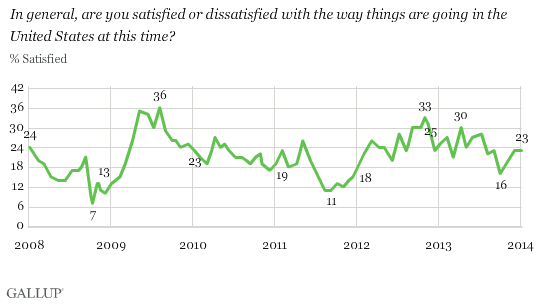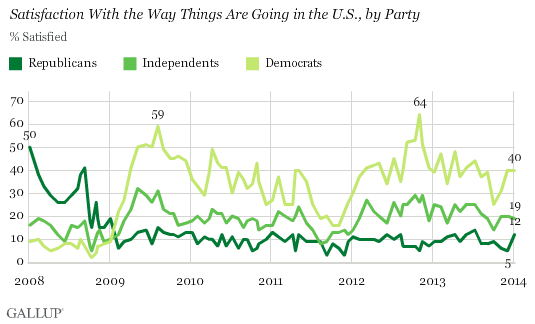PRINCETON, NJ -- Twenty-three percent of Americans say they are satisfied with the way things are going in the U.S. at this time, unchanged from December and within one percentage point of the 24% average for 2013. This month's reading is seven points higher than last year's low of 16% in October, which came during the government shutdown, but is lower than the April 2013 high of 30%.

These results, from a Jan. 5-8 Gallup poll, represent a leveling off from the two-month rebound that occurred after the major drop in satisfaction in October. Last year's monthly satisfaction readings varied widely. The current reading is slightly below the 25% measured last January.
Republican Satisfaction Increases This Month
Democrats remain significantly more likely than independents or Republicans to be satisfied, as has been the case each month since President Barack Obama took office in 2009. This pattern is not unusual; Americans who identify with the party of the sitting president typically are more satisfied than those who don't identify with his party.
Twelve percent of Republicans say they are satisfied with the way things are going in the U.S. in January, up from 5% last month. This is toward the high end of recent Republican satisfaction, which has ranged between 3% and 14% since Obama was inaugurated. On average, 9% of Republicans were satisfied with the way things were going in the country in 2013, putting this month's reading slightly above last year's norm.
Democrats' satisfaction with the country's direction stands at 40% in January, unchanged from December and in line with Democrats' average 39% satisfaction throughout 2013.
Satisfaction among independents has been relatively flat for three months, standing at 19% in January, compared with 20% in the final two months of 2013.

Implications
Americans' attitudes about the nation's direction in the first month of the new year are in line with their average satisfaction last year. However, the recovery in satisfaction from the significant drop in October stalled this month, and the majority of Americans remain dissatisfied with the way things are going in the U.S. at this time.
While Republicans are more positive than they were about where the country is headed, they remain more dissatisfied overall than either independents or Democrats. The improvement this month likely does not signal a coming resurgence in Republicans' satisfaction, as it falls within the range that Gallup has seen over the past few years.
Survey Methods
Results for this Gallup poll are based on telephone interviews conducted Jan. 5-8, 2014, on the Gallup Mood of the Nation Survey, with a random sample of 1,018 adults, aged 18 and older, living in all 50 U.S. states and the District of Columbia.
For results based on the total sample of national adults, the margin of sampling error is ±4 percentage points at the 95% confidence level.
Interviews are conducted with respondents on landline telephones and cellular phones, with interviews conducted in Spanish for respondents who are primarily Spanish-speaking. Each sample of national adults includes a minimum quota of 50% cellphone respondents and 50% landline respondents, with additional minimum quotas by region. Landline and cell telephone numbers are selected using random-digit-dial methods. Landline respondents are chosen at random within each household on the basis of which member had the most recent birthday.
Samples are weighted to correct for unequal selection probability, nonresponse, and double coverage of landline and cell users in the two sampling frames. They are also weighted to match the national demographics of gender, age, race, Hispanic ethnicity, education, region, population density, and phone status (cellphone only/landline only/both, and cellphone mostly). Demographic weighting targets are based on the March 2013 Current Population Survey figures for the aged 18 and older U.S. population. Phone status targets are based on the January-June 2013 National Health Interview Survey. Population density targets are based on the 2010 census. All reported margins of sampling error include the computed design effects for weighting.
In addition to sampling error, question wording and practical difficulties in conducting surveys can introduce error or bias into the findings of public opinion polls.
View methodology, full question results, and trend data.
For more details on Gallup's polling methodology, visit www.gallup.com.
